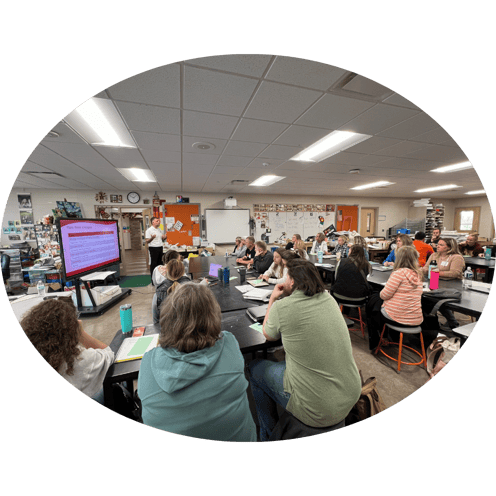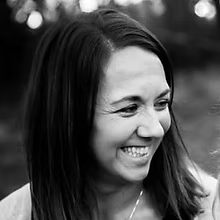
Ready to start your education journey?
Contact us today to create your personalized professional development plan and bring your teaching to the next level.

Appreciation is one of the most compelling and powerful feelings we possess, so why don’t we use it more often in education?
In Think Differently, Jen Townsend shows educators and educational leaders how to use appreciative inquiry to reinvigorate and transform collaborative teams. With a few simple but powerful adjustments, educators can notice their practices to discover and capitalize on the positive work that is already happening in their classrooms.
This book is filled with practical examples, strategies, and reflections, so that educators can see how to think differently about teaching and learning. It explains the neuroscience behind appreciation, the “3i’s” of engagement, and how to utilize social emotional learning (SEL) and universal design for learning (UDL) to collaborate efficiently and effectively.
It’s time to stop focusing on the negatives. Instead, let’s use our strengths and assets to revitalize and nurture our classrooms, teams, and schools.

Jennifer C. Townsend, M.Ed., is an Educational Consultant and the owner of Universal Access Consulting, LLC. Over the past 2 decades, she has worked in collaboration with schools, families, and other professionals to build collective and individual capacity to enhance practices that support the education of individuals with social emotional learning differences including autism spectrum disorder and related disabilities. Jen’s work focuses on using appreciative inquiry techniques and social emotional learning practices paired with universal design for learning. She is the co-author of Social Emotional Engagement Knowledge and Skills (SEE-KS), and has been a contributing author to other works including “Social and Emotional Learning Competencies” for the Wisconsin Department of Public Instruction, A Spectrum of Solutions for Clients with Autism, along with various blogs and articles. Jen shares knowledge in a manner that educators, families, and other community members can learn from and apply specific to their role and skills. She brings to the field of education her experiences in school and home-based programming, social emotional learning and well-being, universal design for learning, trauma-informed care, professional development, leadership, coaching, and mentorship. Jen has a Master's in Education from Johns Hopkins University in Baltimore, Maryland, received a postgraduate certification in Autism Spectrum Disorder from Johns Hopkins University, and attended University of Wisconsin Eau Claire’s Director of Special Education and Pupil Services program. She has also been an adjunct faculty member at Carroll University and Cardinal Stritch University. Jen Townsend is an active member in the field of education and believes that together we can go beyond just making a difference; we can be the difference.
"Imagine if every time you went to work your supervisor highlighted your weaknesses, insisted that you address your shortcomings, and failed to understand you as a human being. You would QUIT THAT JOB! Jen Townsend proposes a better model: appreciative inquiry. This model can be used in schools, with colleagues, and generally for the betterment of humanity. This book is packed with examples, questions for you to ponder, and action items. Further, the appreciative inquiry model flattens hierarchy, helping us to connect human to human, valuing each other for the very best (and the not-so-best!) that we bring to the table, and understanding a variety of ways we all live in this world. If you want a better way to connect with others, truly understand their perspectives, and embrace diversity in all its forms, this is the book for you!"
Rachel Bédard, PhD, Licensed Psychologist, co-editor of "A spectrum of solutions for clients with autism: Treatment for adolescents and adults."
"This book comes at just the right time! At the convergence of neuroscience, UDL, SEL, and appreciative inquiry is learner engagement, a strong sense of belonging, and wellbeing. Jennifer Townsend offers the 3i’s of Engagement, a conceptual and implementational framework that offers educators the opportunity to put students at the center of their schooling. If you’re like me and are committed to student agency and inquiry then this book will speak to you!"
Trevor MacKenzie, educator and author of Dive into Inquiry and the Inquiry Mindset series
There isn’t a better book for this moment in time when student engagement MUST be central to everything we do in schools. Townsend doesn’t just explain the importance of appreciative inquiry, she shows us HOW to implement this process in a way that is meaningful and manageable whether you are a teacher, parent or coach. Thank you Jen for providing a book that opens our minds to thinking differently.
Nancy Weinstein, CEO MindPrint Learning, Author of The Empowered Student
Usually, books written for teachers are focused primarily on students and lessons. Jen Townsend takes a slightly different approach to inspiring change in teaching and learning and prompts educators to look inward. Think Differently offers teachers an invitation to be reflective, focus on their thoughts, and consider how their beliefs impact their decisions. Readers will come away with new ideas for using strategies such as observation, mentorship, and inquiry and a true appreciation for collaborating creatively and contemplating the "why" of classroom work.
Paula Kluth, Ph.D., Author of Universal Design Daily: 365 Ways to Teach, Support & Challenge All Learners

Contact us today to create your personalized professional development plan and bring your teaching to the next level.